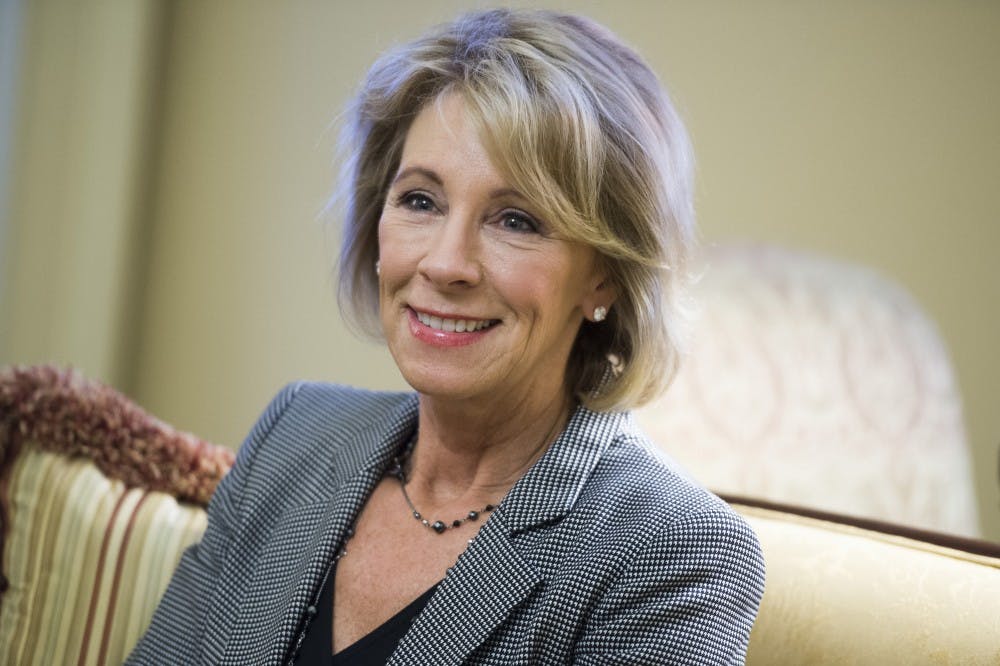Betsy DeVos's nomination for Secretary of Education is something that should give people hope for the future, not dismay – the Department of Education needs reform.
The role that the federal government has played in our education system has not yielded beneficial results. Many on the left often purport that more funding would enhance educational outcomes.
However, this is not the case, and the evidence is clear.
According to the documentary Waiting for Superman, since 1971, educational spending has gone from $4300 to well over $9000 per student. One would assume that with this rising amount of money being spent on education in the United States, test scores would be rising at a proportional rate, but that is wrong – math and reading scores have been stagnant since 1971.
This is where Betsy DeVos comes into play and why she is a good fit for secretary. DeVos has been an avid supporter in the fight for school choice. She strongly supports school vouchers, charter schools and homeschooling and has been a crusader against common core.
“Common core may be good for some children, but the government should not impose any one set of standards or related curricula on all students,” Tom Jenney, the director of the Arizona Chapter of Americans for Prosperity, said.
Jenney makes a very good case here: Imposing the same set of standards on any group of children is not going to work. Just as people learn in different ways, so do children. Children need to be educated by the standard that their parents see fit, not one that is dictated by the state.
Americans for Prosperity has done a lot of work regarding school choice in Arizona. Jenney said that his organization, in collaboration with others, has worked to enact school choice policies, which he prefers to call “parental choice.”
School choice and voucher programs have been proven to be successful in their initiatives, so the Department of Education would benefit from a secretary supportive of those policies.
The burden that the Department of Education bears does not end at the primary or secondary level, it carries over to the post-secondary world as well.
With the rising cost of college tuition over the past several decades, many students at college campuses all over the country want a tuition-free public college system. This is often why so many millennials flock to leaders like Bernie Sanders and democratic socialist policies.
However, what they fail to realize is that the free market can help them in their quest to get a cheaper tuition rate.
One basic rule of economics is that “if you subsidize something, you get more of it,” as argued by Ron Paul, a prominent Libertarian congressman who served in House of Representatives for over two decades.
Colleges have been raising their tuition fees dramatically, and they are doing so because they know that students can afford to pay them if the government has as much money as possible to give out in the form of student loans.
The idea of the government giving out loans like this is well intentioned, but it comes at great costs – literally. For instance, according to the Ron Paul Liberty Report, “In 1971, it took 13 weeks of paychecks for median income household to pay for a year at Harvard ... Now it would take an entire year of median income paycheck to pay for one year of Harvard. That’s a huge inflation and cost.”
This example has played out in college campuses all over the nation, and ASU is no exception. In the year 1987, in-state tuition in ASU was well below $3,000 and in 2012, it was over $8,000, adjusted for inflation.
“I am taking both subsidized and unsubsidized loans. Right now, (in) total I have about $35,000 worth in loans out at the moment,” applied computing senior Taylor Shackelford said.
This is an astonishingly high number, and unfortunately, many others at ASU are in the same situation. Student loan debt is haunting many students here, and it will burden them for life.
If the government were to abolish the student loan system, colleges would then be forced to compete to get students admitted. This type of competition in the marketplace would automatically lower tuition rates as it does with anything in the marketplace.
The government’s role in education has not been very fruitful. It has done nothing to change the system and has even caused harm to it. All of these government programs have good intentions, but they have very little to offer as results. With DeVos as secretary, there is hope for change in a failing system.
Reach the reporter at vpappuse@asu.edu or follow @vpappuse on Twitter.
Editor’s note: The opinions presented in this column are the author’s and do not imply any endorsement from The State Press or its editors.
Want to join the conversation? Send an email to opiniondesk.statepress@gmail.com. Keep letters under 300 words and be sure to include your university affiliation. Anonymity will not be granted.
Like The State Press on Facebook and follow @statepress on Twitter.




